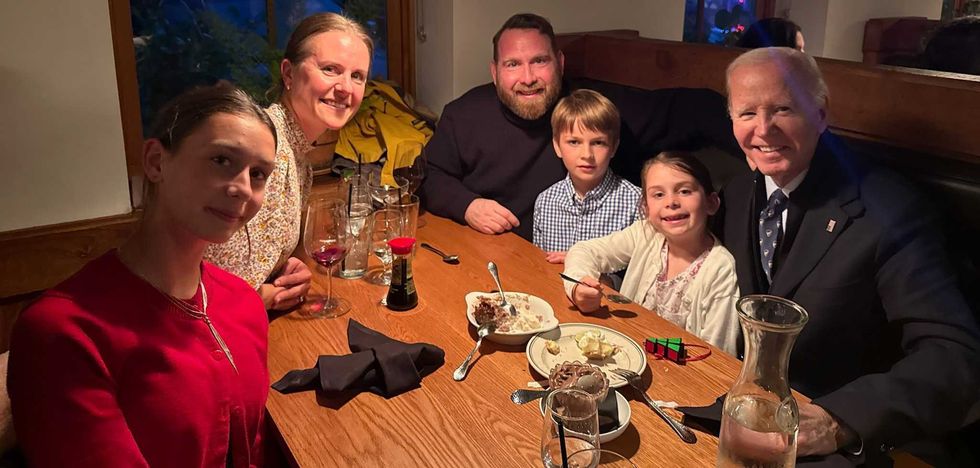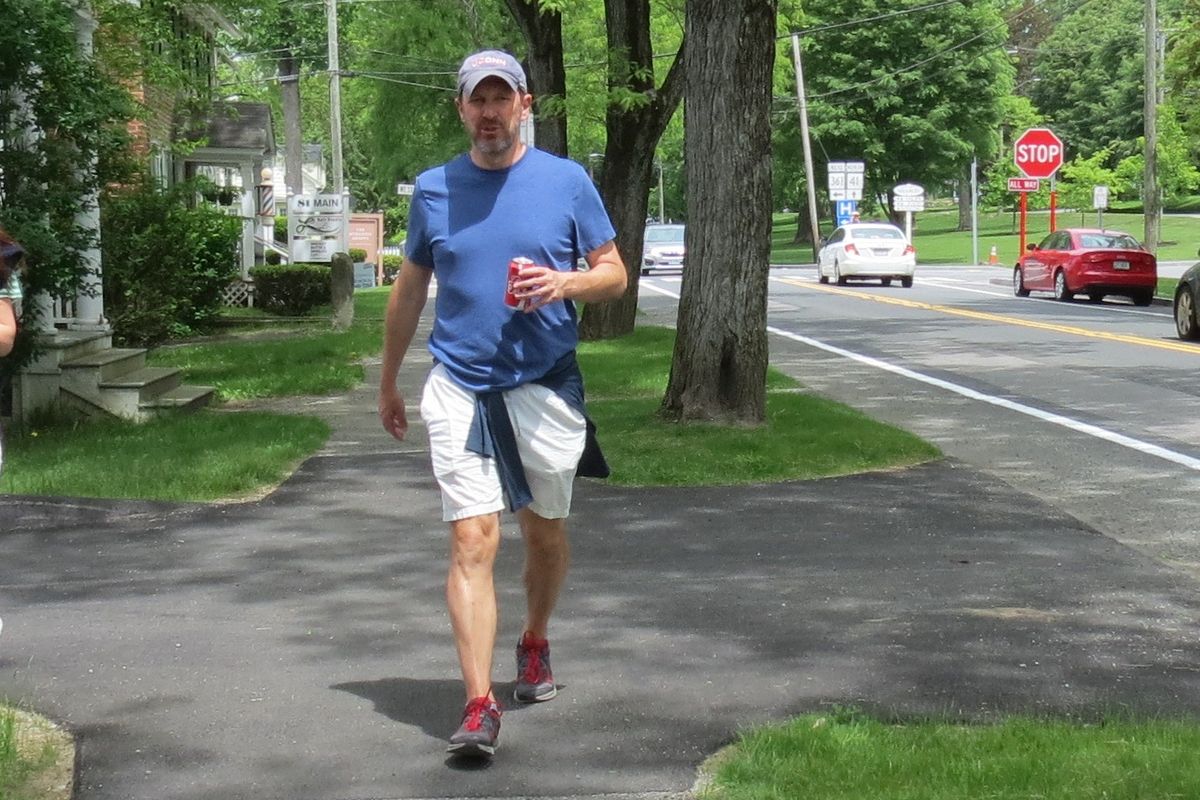Latest News
Dining with Biden at The Woodland
May 29, 2025
Former President Joe Biden and his family dined at The Woodland in Lakeville Thursday, May 22.
Photo provided
LAKEVILLE — A fleet of black SUVs maintained a watchful perimeter outside The Woodland Thursday, May 22, as a former president dined inside.
After attending his grandson’s graduation at Salisbury School, Joe Biden and his family shared a meal at the Lakeville eatery.
Brandon Scimeca, owner of The Woodland, said the reservation was made a few days in advance. The day of the dinner, Secret Service agents arrived in the afternoon to review a security plan with Scimeca.
“They told me where he would enter and exit from, where he would sit, where Jill would sit,” said Scimeca. Later that evening, he said, 10 agents were stationed inside the restaurant with about 15 more outside.
Scimeca said Biden “treated the busboy as nice as the waiter. He was so nice to everyone.”
He ordered a hamburger well done with extra tomatoes and a cola.
Other patrons, able to avoid Secret Service, snapped selfies when Biden got up to go to the restroom, but for most of the meal he and his family quietly enjoyed their dinner.
That is, until dessert arrived at the table next to him.
Billy Sheil, who was dining with his wife and three of his four children, said Biden raised his fork and gestured at the arrival of sweets, “suggesting he wanted to sit with us or come over and take a bite,” Sheil explained.
Sheil scooted to make room in the booth and waved him over. “No fanfare. He just introduced himself and started chatting as a regular guy.”
Biden had a bite of ice cream from Sheil’s daughter Islay’s plate and chatted for about 15 minutes.
Sheil said he shared wisdom, spoke of family, the importance of siblings and the role his sister played throughout his political career.
“He spent real time with us, asking thoughtful questions and sharing in our evening like a grandfather would,” recalled Sheil. “We told him and Jill that we have four kids too — just like them — and mentioned that our second, Quin, was ironically in Washington, D.C., on a school trip. I told them, ‘He’s going to be bummed when he hears what he missed tonight!’”
The family took a photo with the former president before parting ways. Sheil noted, “When we got in the car afterward, Aerin turned to me and said, ‘Dad… was that a dream?’ It kind of felt like one.”

Keep ReadingShow less
U.S. Sen. Chris Murphy walks through Sharon on the first day of his annual statewide walk.
Photo by Ruth Epstein
Decked out in a blue T-shirt, khaki shorts and a UConn cap, the man walking along Route 41 in Sharon Wednesday morning looked like others who just enjoy getting out to commune with nature. But U. S. Sen. Chris Murphy (D) had some other thoughts on his mind.
For the ninth year, he was walking across Connecticut to connect with citizens of the state. This year’s route began May 28 in Salisbury and took him to Sharon and Kent for the day.
People along the way wanted to chat with the lawmaker, and despite some gentle prodding from his staffers to keep on pace, Murphy took time to converse with those he met covering a variety of topics. On Route 41 between Lakeville and Salisbury, he encountered longtime friend, former State Rep. Roberta Willis, of Salisbury, who along with her sister Sherie Berk, greeted him with a sign stating “Chris, We’re proud of U.”
Continuing his walk, he made a stop at Sharon Center School where he spoke with sixth- and seventh-graders. Then he met with some of the younger children, who, he said, “had a million ideas about what they could do for our country.”

Following a stop at Standard Space art gallery, he proceeded to Town Hall, where First Selectman Casey Flanagan presented him with a tiny step counter. Pleased with the gift, he said he had been wanting to get one but never got around to it.
At Town Hall, the subject of Mudge Pond came up, with the selectmen telling him how important that natural resource is to the town. Selectman Lynn Kearcher said so far, its condition is not too bad, but the threat of an invasion of hydrilla is a constant worry. “Lynn and I both grew up on that lake. We want to save it for generations to come,” said Flanagan.
Kearcher asked what the citizens of Sharon can do to combat the current administration in Washington. Murphy recommended joining activist groups and getting involved. “All that can make a difference.”
He acknowledged the latest big bill proposed by the Republicans which was approved by the House of Representatives is bad for Connecticut. One of its features calls for reducing Medicaid payments in blue states by 10 percent. It will throw millions around the country off the plan, he said. The bill will also result in adding $3.5 trillion to the national debt.
“It’s an ugly bill,” said Murphy.
As he headed off to Kent, he was met by some Sharon Playhouse employees who excitedly told him about this year’s productions. The walk to Kent proved to be a strenuous one, with a long steep mountain to climb. Once in the center of Kent, he crossed over the Housatonic River on the bridge next to Kent School.

Murphy explained the purpose of the walk, which over the nine years has touched all areas of the state. “My job is to listen. I can’t do my job well unless I listen to what people are saying.”
On this trip, he found the issues of housing and Medicaid were what people were talking about. The push and pull between conserving land and the need for housing was also on people’s minds.
In Kent, he made a stop at Motoriot, where owner Jason Doornick explained he refurbishes vintage 4 x 4s. Murphy was impressed with what he saw. He also visited Kent Wine & Spirits and the Mobil station and convenience store where customer Tom Connors approached him and asked, “When did bravery go out of fashion?”
Murphy planned to walk another four days with the aim of reaching Long Island Sound.
Keep ReadingShow less
Marion J. Pedersen
May 28, 2025
SHARON — Marion J. (Cookingham) Pedersen of Sharon, passed peacefully on May 20, 2025, at the age of 91.
Born in Pine Plains, New York, she lived a life of love and unwavering strength. She was a devoted mother, grandmother, great-grandmother and wife known for her cooking skills.
Her greatest joy was taking care of and feeding her family. For over 50 years she knew most of the children in Sharon, either by driving them to and from school on the bus or by feeding them lunch in the Sharon Center School cafeteria. She will be missed by so many.
She is survived and missed by her husband of 74 years, Niels (Pete) Pedersen, her two sons Niels (Peter) Pedersen Jr., and wife Lori of Sharon, Dennis Pedersen and wife Bonnie of Winchester, and her daughter, Deborah Pedersen of Winsted. She will forever be cherished and remembered by her granddaughters, Hollie Boyuk and husband Michael, Sarah White and husband Michael, five great-grandsons, Dylan and wife Ashley, Brandon, Caleb, Christopher and Jacob, and numerous other family members who will miss her dearly.
Marion was the youngest of 12 children and predeceased by her 11 siblings.
All services are private.Memorial contributions may be made to the donors choice. Kenny Funeral Home has care of arrangements.
Keep ReadingShow less
Eleanor Sternlof
May 28, 2025
LIME ROCK — Eleanor Anne Sternlof (née de Guise) of White Hollow Road passed away on April 25, 2025 at Geer Village in North Canaan, Connecticut. She was 94 and the loving wife of the late Paul William Sternlof, who died on August 12, 2005.
Calling hours will be held on Saturday, May 31, from 11am to 1pm at The Kenny Funeral Home, 41 Main Street, Sharon, CT.
The Kenny Funeral Home has care of arrangements.
Keep ReadingShow less
loading









